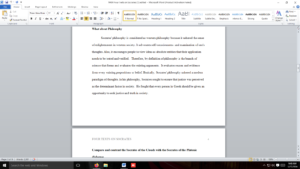Aristophanes and Plato
Please answer ALL of the following questions based on the book below:
Four Texts on Socrates by Aristophanes and Plato (West and West)
You should demonstrate that you have read the texts by quoting (sparingly) from important passages (and citing the page number), and by demonstrating a general familiarity with them.
1. What are the needs of the political community? What must all political communities do to insure their survival? What about Philosophy? What does philosophy seek? How does it go about this process? Now, please compare and contrast the Socrates of the Clouds, with the Socrates of the Platonic dialogues.
2. Is Socrates against nature, or following it? Please draw examples from Aristophanes’ The Clouds and the relevant PlatonicDialogues.
3. Does Socrates use the “unjust” speech? In order to answer this question, you should first define what the unjust speech is. Why is it unjust? And, is Socrates guilty of using it? If so, why? If not, why?
4. Does he invent new Gods? Or, does he follow the Gods of the city, i.e., the Delphic Oracle?
5. Last, does Socrates corrupt the youth? What is your opinion?
PLEASE WRITE 7 TYPED PAGES, DOUBLE SPACED, TIMES NEW ROMAN
PLEASE DO NOT PLAGIARIZE.
Answer preview
Socrates’ philosophy is considered as western philosophy because it ushered the sense of enlightenment in western society. It advocates self-consciousness and examination of one’s thoughts. Also, it encourages people to view ideas as absolute entities that their application needs to be tested and verified. Therefore, by definition of philosophy is the branch of science that forms and evaluates the existing arguments. It evaluates reason and evidence from every existing prepositions or belief. Basically, Socrates’ philosophy ushered a modern paradigm of thoughts. In his philosophy, Socrates sought to ensure that justice was perceived as the determinant factor in society. He fought that every person in Greek should be given an opportunity to seek justice and truth in society.
[2087 Words]

Aristophanes and Plato

